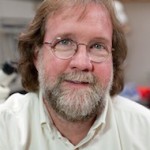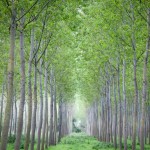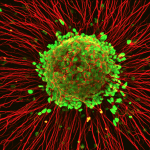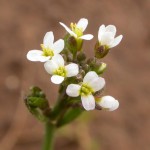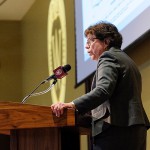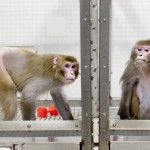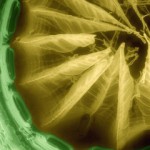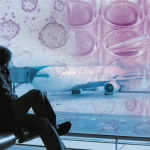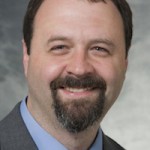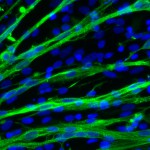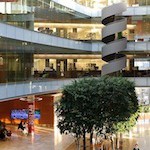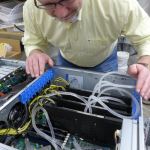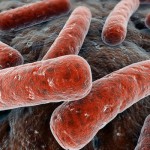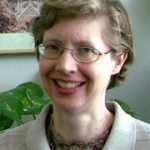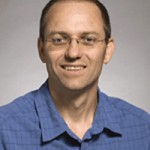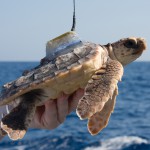Tag Research
“Your Inner Fish,” with strong UW connections, premieres on PBS
A University of Wisconsin–Madison professor wants to help more people get to know their ancestors. Read More
Study helps unravel the tangled origin of ALS
By studying nerve cells that originated in patients with a severe neurological disease, a University of Wisconsin–Madison researcher has pinpointed an error in protein formation that could be the root of amyotrophic lateral sclerosis. Read More
How plants adapt: Calcium waves help the roots tell the shoots
For Simon Gilroy, sometimes seeing is believing. In this case, it was seeing the wave of calcium sweep root-to-shoot in the plants the University of Wisconsin–Madison professor of botany is studying that made him a believer. Read More
Monkey caloric restriction study shows big benefit; contradicts earlier study
The latest results from a 25-year study of diet and aging in monkeys shows a significant reduction in mortality and in age-associated diseases among those with calorie-restricted diets. The study, begun at the University of Wisconsin–Madison in 1989, is one of two ongoing, long-term U.S. efforts to examine the effects of a reduced-calorie diet on nonhuman primates. Read More
Winning images reveal the aesthetic side of UW science
From the frumpish mug of an oyster toadfish to delicate crystalline “flowers” of cobalt pyrite, 12 winners of the 2014 University of Wisconsin–Madison Cool Science Image contest were announced today, Tuesday, March 24. Read More
‘Stem cell tourism’ takes advantage of patients, says law professor
Desperate patients are easy prey for unscrupulous clinics offering untested and risky stem cell treatments, says law and bioethics Professor Alta Charo of the University of Wisconsin–Madison, who is studying "stem cell tourism." Read More
Research finds soda tax does little to decrease obesity
Extra sales taxes on soda may not do anything to improve people's health, according to new research from health economist Jason Fletcher of the La Follette School of Public Affairs at the University of Wisconsin–Madison. Read More
Researchers discover new way to make muscle cells from human stem cells
As stem cells continue their gradual transition from the lab to the clinic, a research group at the University of Wisconsin–Madison has discovered a new way to make large concentrations of skeletal muscle cells and muscle progenitors from human stem cells. Read More
New Milky Way portrait to be on Town Center media wall
The dramatic new infrared picture of the plane of our galaxy will be viewable for the next week on the large media wall in the Town Center of the Wisconsin Institutes for Discovery on the UW–Madison campus. Read More
Startup focuses on reliable, efficient cooling for computer servers
In a dark, windy room on the top floor of Engineering Hall on the University of Wisconsin–Madison campus, racks of computers are processing information for a college that relies, like all technical fields, on massive computing power. The noise comes from multiple fans located inside each computer case and from the large air conditioner that drives currents through the room to remove waste heat from the processors. Read More
In the lab, scientists coax E. coli to resist radiation damage
Capitalizing on the ability of an organism to evolve in response to punishment from a hostile environment, scientists have coaxed the model bacterium Escherichia coli to dramatically resist ionizing radiation and, in the process, reveal the genetic mechanisms that make the feat possible. Read More
Halting immune response could save brain cells after stroke
A new study in animals shows that using a compound to block the body’s immune response greatly reduces disability after a stroke. Read More
Study suggests potential association between soy formula and seizures in children with autism
A University of Wisconsin–Madison researcher has detected a higher rate of seizures among children with autism who were fed infant formula containing soy protein rather than milk protein. Read More
Small scale, large potential: An expert weighs in on the future of microfluidics
More than a decade ago, David Beebe wrote that the field of microfluidics had the potential to significantly change modern biology. Now Beebe, an expert in the field, has written a high-level perspective on the state of microfluidics for the journal Nature. Read More
Baby sea turtles spend ‘lost years’ in warm blankets of seaweed
Nosing their way out of eggs buried in sandy beaches from Florida’s east coast north into the Carolinas, baby loggerhead sea turtles race to the water as fast as their flippers will carry them and begin a swim frenzy to clear the predator-rich shore. Read More

